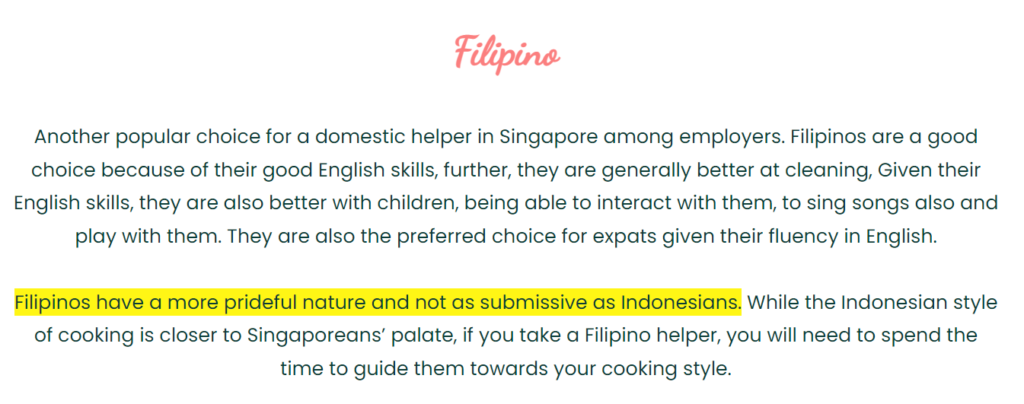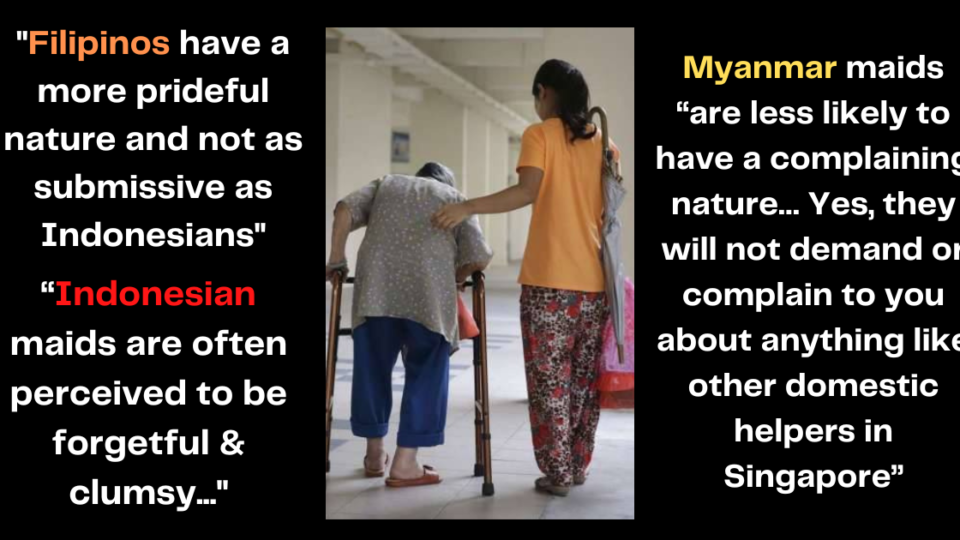Domestic workers from Indonesia are “… more submissive [and] appear more obedient… However, because of their innate characteristics, they tend not to speak up so if you prefer someone who is vocal and assertive, Indonesians may not be the best choice.”
“Most Mizoram maids come from the mountain areas, which leads to them having a hardier constitution, and are stronger physically, with more endurance then the other races.”
“Filipinos have a more prideful nature and [are] not as submissive as Indonesians.”

Those racially stereotyped descriptions were, until recently, featured on the website of Best Housekeeper, a domestic worker agency in Singapore. They were quietly removed from the site late last week but can be seen in full on an Internet Archive snapshot of the page taken on Sept. 28.
Hoping for an explanation for the removal, Coconuts called Best Housekeeper’s office but were told they were “not interested” in speaking to the media. So we must surmise they were taken down in response to the outrage over a viral tweet that highlighted them last week.
While the backlash may have led to one domestic worker agency removing racially stereotyped language from their website, we were able to find plenty of similar examples used by other agencies and their affiliates. Migrant worker advocacy groups say such language can have a serious impact on their working conditions and treatment.
“Hiring domestic workers based on purported nationality-based traits diminishes the need to give them strong labour protections, and takes away from their right to decent work conditions, which ultimately is detrimental to their physical and mental well-being.“
– Humanitarian Organisation of Migration Economics (HOME), a migrant workers advocacy group based in Singapore
The tweet that surfaced Best Housekeeper’s descriptions was made in response to a much-discussed clip of the late great Anthony Bourdain telling a table of Singaporeans how he really felt about their reliance on domestic workers.
More than a few commenters said the language used reminded them of a slave auction.
what in the slave auction
— Jin 🦔⸆⸉|Midnights Oct21 (@folkloreforevrr) September 26, 2022
A widespread issue
This is far from an isolated case involving a single company. With little effort, we were able to find similar examples of racially stereotyped language on the websites of many domestic worker agencies and their affiliates.
This description of domestic workers from Myanmar comes from the Frondosa City Employment Agency website:
Here’s the description of Indonesian domestic workers used on the EazyMaid website:
And here’s EazyMaid’s description of Sri Lankan domestic workers:
Here are some of the benefits of hiring a domestic worker from Myanmar listed in an article on Homee.co:
This is from the Searchmaids.sg FAQ page on Indonesian domestic workers:
We should strive to treat domestic workers with dignity, and not as commodities where we attribute arbitrary, baseless stereotypes to them based on where they come from.”
Humanitarian Organisation of Migration Economics (HOME)
In 2014, Al Jazeera caused an uproar with its reporting on foreign domestic workers (FDWs) being put on display and made available for ‘purchase’ in Singapore’s shopping malls. In that article, Jolovan Wham, executive director of the Humanitarian Organisation of Migration Economics (HOME), a migrant workers advocacy group based in Singapore, noted how racial stereotypes were also sometimes used by employment agencies: “Some of the stereotypes include Filipinos as ‘smarter’, Indonesians as ‘less bright’ and Burmese as ‘sweet-natured and compliant’”.
In response to the Al Jazeera report, Singapore’s Ministry of Manpower (MOM) sent out an advisory banning employment agencies from “insensitive advertising and inappropriate display” of maids by agencies. MOM said all advertising should “accord foreign domestic workers (FDWs) basic respect and human dignity”. The president of the Association of Employment of Agency (AEA) in Singapore specified that advertising materials should not refer to promotional rates, fees, and racial stereotypes of workers and that employment agencies that violated those guidelines would receive demerits and potentially lose their licenses.
Asked to respond to the continued use of this kind of stereotyped language by some domestic worker agencies and their affiliates, a spokesperson for HOME told Coconuts:
“Agents, who are instrumental in matching employers and domestic workers, should not be perpetuating nationality-based stereotypes. They should endeavor to match employers and domestic workers with considerations such as whether the domestic worker will be given a decent working and living environment in the employer’s house, and whether the job requirements and workload are reasonable for the domestic workers, instead of amplifying sweeping presumptions of their personalities to employers.”
Hiring domestic workers based on purported nationality-based traits diminishes the need to give them strong labour protections, and takes away from their right to decent work conditions, which ultimately is detrimental to their physical and mental well-being.
We should strive to treat domestic workers with dignity, and not as commodities where we attribute arbitrary, baseless stereotypes to them based on where they come from.”
It’s impossible to quantify how much dehumanizing racial stereotypes contribute to the mindset that leads some employers to mistreat domestic workers but there is no doubt that mistreatment remains a major issue. There have been many high-profile cases about FDWs in Singapore experiencing horrific physical abuse at the hands of their employers, but the dehumanizing emotional abuse many suffer has also been well documented, if not as widely discussed.
A 2017 study by independent consultancy group Research Without Borders found that 60 percent of domestic workers in Singapore said they were exploited by their employers, including receiving low pay, little time off work and verbal and physical abuse.
At least 90 percent of those surveyed reported working excessive hours, with 84 percent saying they worked more than 12 hours a day and 41 percent saying they were forced to work on their sole mandated rest day.
Singapore’s Ministry of Manpower responded by calling the study “misleading” and referring to its own 2015 survey that said an astounding 97% of FDW were satisfied working here and had no issues with their workload.
Related




